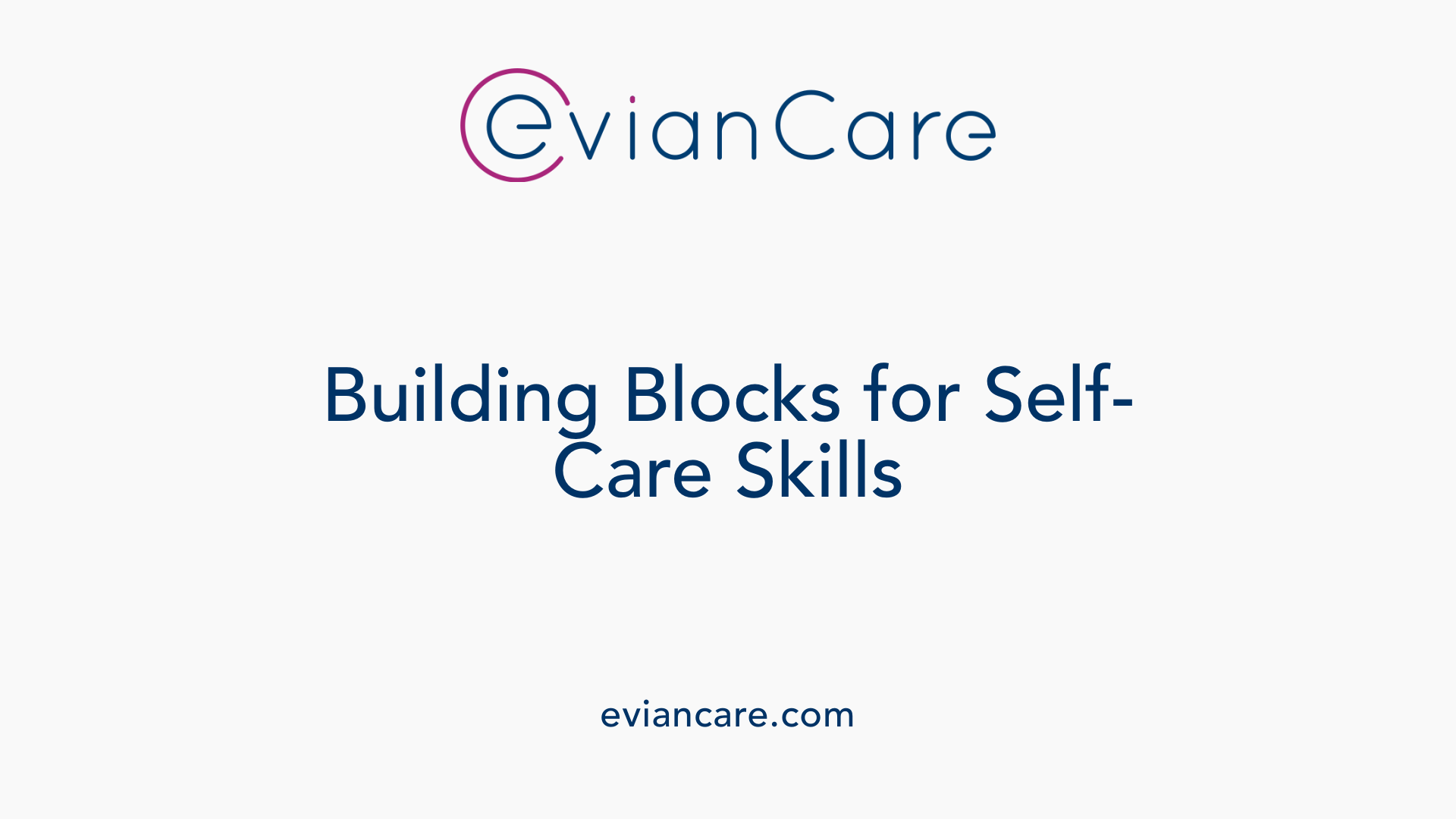
Understanding the Impact of Occupational Therapy on Pediatric Self-Care Skills
Occupational therapy (OT) plays a vital role in supporting children to develop and maintain essential self-care skills. By addressing diverse physical, sensory, and cognitive challenges, OT helps young individuals achieve greater independence in daily activities such as dressing, grooming, and feeding. This article explores how occupational therapy interventions promote self-care, especially for children facing developmental delays or unique needs, and highlights the strategies used to foster confidence and autonomy in everyday routines.
Foundations of Self-Care Skill Development in Children

How can occupational therapy help children develop self-care skills?
Occupational therapy plays a vital role in supporting children to master self-care activities such as toileting, grooming, dressing, feeding, brushing teeth, and bathing. Therapists develop personalized plans that focus on overcoming motor, sensory, and cognitive challenges that may interfere with these daily tasks.
To improve independence, therapists often use sensory integration techniques to help children better tolerate grooming and dressing routines. For example, they might incorporate weighted blankets or compression garments to address sensory processing difficulties, making activities like brushing teeth or dressing less overwhelming.
Motor skill training is also essential. Therapists employ exercises and activities to strengthen core muscles, improve coordination, and enhance motor planning, all of which are crucial for tasks like buttoning shirts or zipping jackets. Fine motor skills, including dexterity and hand strength, are developed through activities such as manipulating utensils or fastening buttons.
Cognitive strategies, including establishing routines and using visual schedules, help children understand and remember the steps involved in self-care tasks. Routine consistency decreases anxiety and fosters confidence, while visual cues support sequencing and initiation.
Safety and independence are further promoted by incorporating adaptive equipment—like button hooks, weighted utensils, and shoehorns—that makes self-care easier. Caregivers also receive training from therapists to reinforce skills at home and in community settings.
Early intervention is critical. Assessments tailored to each child's needs guide strategies and ensure that development is supported through activities tailored to their individual abilities. This holistic approach helps children develop self-confidence, autonomy, and readiness for daily adult responsibilities.
| Aspect | Intervention Strategies | Equipment & Tools |
|---|---|---|
| Sensory Processing | Use of weighted blankets, compression garments, sensory activities | Weighted utensils, sensory toys |
| Motor Skills | Strengthening exercises, coordination games, motor planning activities | Resistance bands, balance balls |
| Cognitive & Routine Skills | Visual schedules, routine establishment, verbal cues | Visual aids, timers |
| Adaptive Tools | Custom devices to facilitate independence | Button hooks, shoehorns, special utensils |
Through these integrated approaches, occupational therapy enhances children’s ability to participate confidently in daily self-care routines, setting a strong foundation for lifelong independence.
Techniques and Strategies to Promote Self-Care Independence

What strategies and techniques are used in occupational therapy to enhance self-care independence in children?
Occupational therapists utilize multiple targeted strategies to support children in developing independence with daily self-care routines. One fundamental approach involves the use of adaptive equipment, which makes self-care tasks more manageable. For example, therapists might recommend button hooks, zipper pulls, weighted utensils, and shoe horns to assist children with dressing, grooming, and feeding activities.
Creating structured routines and visual schedules also plays a vital role. These tools help children understand, remember, and follow step-by-step sequences for tasks like brushing teeth, dressing, or bathing. Visual aids and consistent routines reduce anxiety and encourage independence.
Addressing sensory processing difficulties is another essential element. Many children find certain textures or sensations overwhelming, which can hinder self-care routines. Sensory strategies, such as providing weighted blankets or using compression garments, can improve tolerance and facilitate smoother participation in grooming and dressing.
Building physical strength and stability supports easier task completion. Activities focused on core strengthening—using resistance bands, stability balls, or balance exercises—enhance posture and muscle endurance.
Fine motor skills are crucial for tasks like buttoning, zipping, and using utensils. Occupational therapy emphasizes exercises and activities to refine these skills, ensuring children can manage small objects confidently.
Supporting executive functions, including attention, sequencing, and initiation, helps children plan and start activities independently. Strategies include visual prompts, verbal cues, and breaking tasks into manageable steps.
Lastly, environmental modifications and task adjustments tailor the child's surroundings to promote success. This might involve organizing the bathroom or dressing area for easy access or simplifying complex tasks.
All these techniques, combined with caregiver education and intervention both in clinical settings and at home, foster improved self-care skills, promoting greater independence and confidence in children.
Benefits of Occupational Therapy for Daily Living Skills

What are the benefits of occupational therapy in improving daily living skills for children?
Occupational therapy (OT) plays a vital role in helping children build essential self-care skills, promoting independence and confidence in managing daily tasks. By focusing on individual needs, therapists develop tailored strategies and introduce adaptive tools such as button hooks, weighted utensils, or shoe horns. These modifications make activities like dressing, feeding, and grooming more accessible.
Creating structured routines and visual schedules is another effective strategy used in OT. These tools help children understand the sequence of tasks, reducing confusion and anxiety while fostering autonomy.
Addressing sensory processing difficulties is crucial, as sensory sensitivities can hinder children’s ability to tolerate grooming and dressing. Sensory strategies, including weighted blankets and compression garments, can improve a child's sensory regulation, making self-care activities more manageable.
OT also supports physical and cognitive development by enhancing strength, stability, coordination, and motor planning skills. For example, exercises using resistance bands or balance activities can improve core strength necessary for self-care tasks.
Supporting executive functions, like attention, sequencing, and initiation, helps children start and complete activities independently. These skills are reinforced through practical practice in real-world settings, such as at home or school.
Furthermore, occupational therapists often work closely with families, providing caregiver education to ensure consistent support and practice outside therapy sessions. This holistic approach helps children develop greater independence, improve their quality of life, and participate more actively in family, school, and community activities.
| Benefit Area | Intervention Strategies | Additional Details |
|---|---|---|
| Independence in self-care | Adaptive equipment, routines, visual schedules | Includes tools like button hooks, weighted utensils, and environmental modifications |
| Physical development | Strengthening exercises, balance activities | Utilizes resistance bands, stability balls, and motor planning tasks |
| Sensory integration | Sensory strategies, sensory tools | Uses weighted blankets, compression garments, to address sensory challenges |
| Cognitive and executive skills | Task sequencing, cueing, modeling | Focuses on attention, initiation, and sequencing skills |
| Family involvement | Caregiver training, home programs | Ensures skills transfer and consistency in daily routines |
Occupational therapy’s personalized and comprehensive approach significantly improves children’s ability to participate fully in daily life, setting a foundation for future independence and success.
Intervention Practices in Occupational Therapy for Self-Care Support

What intervention practices are employed in occupational therapy to support children's self-care independence?
Occupational therapists apply a range of targeted strategies to help children improve their personal care skills. They begin with thorough assessments to understand each child's unique needs and set personalized, achievable goals. This tailored approach ensures interventions are relevant and effective.
To make self-care tasks more manageable, therapists often modify activities and adapt the environment. For example, they might recommend the use of visual schedules that clearly outline each step of a task, helping children understand and remember sequences. Adaptive equipment like button hooks, weighted utensils, and shoe horns are introduced to support independence and reduce frustration.
Building a trusting relationship is essential; therapists use techniques that motivate and engage children, making therapy sessions enjoyable and meaningful. This, in turn, enhances the child's willingness to try new skills.
Focusing on development, occupational therapists work on improving fine motor skills, sensory processing abilities, and executive functions such as attention and sequencing. Strengthening these areas helps children perform tasks like buttoning, zipping, brushing teeth, and dressing more efficiently.
Consistency is vital for success. Therapists help families establish routines that incorporate self-care activities into daily life, providing stability and predictability. This consistency not only builds skills but also reduces anxiety related to self-care tasks.
Overall, these comprehensive practices—combining assessment, task modification, skill development, and routine establishment—are crucial components of occupational therapy aimed at fostering independence and confidence in children’s self-care abilities.
Supporting Children with Developmental Delays or Special Needs

How does occupational therapy support children with developmental delays or special needs in acquiring self-care skills?
Occupational therapy (OT) plays a vital role in helping children with developmental delays or special needs develop essential self-care skills. Therapists begin with thorough assessments to identify specific weaknesses in areas like motor coordination, sensory processing, cognition, and daily routines.
Based on these evaluations, OTs design personalized intervention plans. These plans often incorporate fun and engaging activities such as play-based tasks, sensory integration techniques, and targeted skill training. The goal is to enhance the child's abilities in tasks like grooming, dressing, feeding, and toileting.
Interventions are tailored to promote overall development, focusing on improving fine motor skills like buttoning or zipping, gross motor skills such as balance and strength, and sensory regulation to tolerate grooming routines.
Parents are a crucial part of this process. They are encouraged to actively participate, implement strategies at home, and reinforce learned skills. This involvement fosters better skill generalization, consistency, and confidence in the child.
Overall, OT aims to help children reach key developmental milestones, foster independence, and improve their overall quality of life. These interventions are comprehensive, multidisciplinary, and adaptable to each child's unique needs, ensuring meaningful progress in self-care and daily living skills.
Holistic and Multidisciplinary Approach in Occupational Therapy
 Occupational therapy (OT) is an essential healthcare service that supports individuals of all ages, especially children with developmental delays or special needs. It focuses on helping children acquire and enhance everyday self-care skills such as dressing, grooming, feeding, and bathing. Therapists tailor their interventions to each child's unique needs through comprehensive assessments that identify specific skill gaps in areas like motor coordination, sensory processing, and cognitive functions.
Occupational therapy (OT) is an essential healthcare service that supports individuals of all ages, especially children with developmental delays or special needs. It focuses on helping children acquire and enhance everyday self-care skills such as dressing, grooming, feeding, and bathing. Therapists tailor their interventions to each child's unique needs through comprehensive assessments that identify specific skill gaps in areas like motor coordination, sensory processing, and cognitive functions.
A central element of occupational therapy is the development of personalized treatment plans. These plans set clear, achievable goals and incorporate various techniques, including play-based activities, sensory integration strategies, and skill training exercises. For children, engaging activities like symbolic play and task-specific practice facilitate skill mastery while making learning enjoyable.
Collaboration is vital in OT. Therapists often work closely with parents, teachers, and other health professionals to ensure that interventions are consistent across different environments such as home, school, and clinics. This teamwork enhances the child's progress and helps embed new skills into daily routines.
Occupational therapy also emphasizes a broad support system, incorporating cognitive, physical, and mental health strategies. Improving motor skills and strength, addressing sensory sensitivities, and enhancing focus and self-initiation are some areas targeted to boost independence. Use of adaptive equipment like button hooks, weighted utensils, or home modifications can further support a child's ability to perform daily tasks.
Interventions are delivered in various settings, including homes, schools, hospitals, and community clinics. Family involvement and caregiver education are crucial for generalizing skills and maintaining progress outside therapy sessions. By integrating these multidisciplinary strategies, OT empowers children to participate actively in daily life, thereby elevating their independence and quality of life.
The Role of Caregiver and Family Involvement

How does occupational therapy support children with developmental delays or special needs in acquiring self-care skills?
Occupational therapy plays a vital role in helping children with developmental delays or special needs develop essential self-care skills such as grooming, dressing, and feeding. Therapists start with thorough assessments to understand each child's unique strengths and challenges. Based on these insights, they create personalized intervention plans that focus on improving motor skills, sensory processing, and cognitive abilities. These plans often include engaging activities like play and sensory exercises that make learning self-care enjoyable and effective.
A significant part of therapy involves coaching parents and caregivers. They learn strategies to support their child's progress, including how to encourage independence and incorporate self-care tasks into daily routines. Parent participation is emphasized because it helps reinforce skills learned during therapy sessions and ensures consistency across home environments. Children are more likely to generalize these skills when they see routines and cues used regularly.
Therapists also teach families to create routines and visual schedules. These tools help children understand what to expect and how to sequence activities such as brushing teeth or dressing. Visual cues can include pictures, charts, or prompts that guide children step by step, reducing anxiety and increasing confidence.
Involving families in this way ensures a supportive environment conducive to continuous learning. With consistent support at home, children make steady progress toward becoming more independent in their daily lives, improving their overall well-being and confidence.
Empowering Future Generations Through Occupational Therapy
Occupational therapy is fundamental in equipping children with the skills they need to lead independent, fulfilling lives. By combining personalized strategies, environmental modifications, and active caregiver involvement, OT addresses individual challenges and promotes progress across motor, sensory, and cognitive domains. Early intervention, multidisciplinary collaboration, and the use of adaptive tools further enhance therapy outcomes. Supporting children in gaining self-care independence not only improves their current functioning but also lays a strong foundation for lifelong participation in daily activities, building confidence and resilience for future challenges.
References
- Top 10 Ways Occupational Therapy Can Help Children ...
- Self-Care Skills: 5 Essential OT Tips
- Advantages of Occupational Therapy: A Path to Wellness
- An Intervention To Promote the Self-Care Independence of ...
- A Scoping Review of Intervention Implementation for Self ...
- How Occupational Therapy Elevates Lives
- Developmental delay












